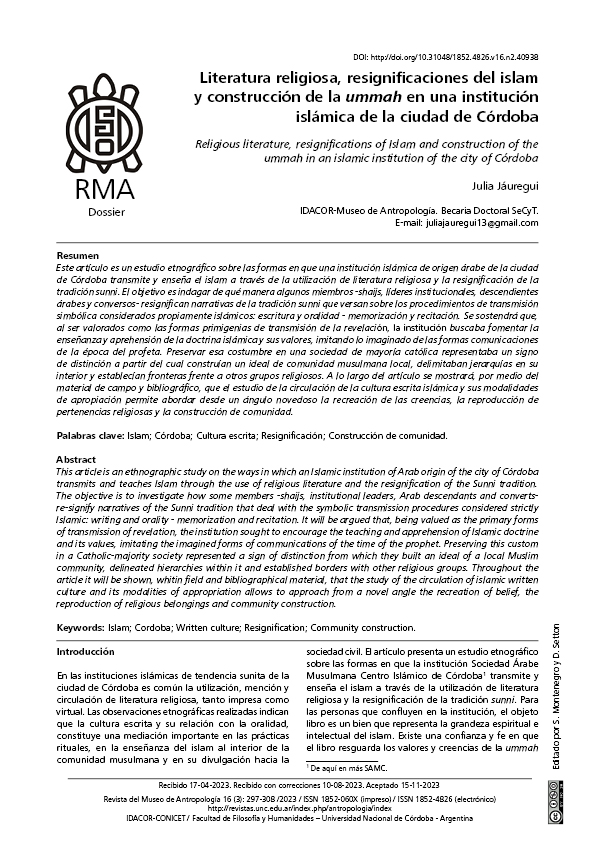Religious literature, resignifications of Islam and construction of the ummah in an islamic institution of the city of Córdoba
DOI:
https://doi.org/10.31048/1852.4826.v16.n2.40938Keywords:
Islam, Cordoba, Written culture, Resignification, Community constructionAbstract
This article is an ethnographic study on the ways in which an Islamic institution of Arab origin of the city of Córdoba transmits and teaches Islam through the use of religious literature and the resignification of the Sunni tradition. The objective is to investigate how some members -shaijs, institutional leaders, Arab descendants and converts- re-signify narratives of the Sunni tradition that deal with the symbolic transmission procedures considered strictly Islamic: writing and orality - memorization and recitation. It will be argued that, being valued as the primary forms of transmission of revelation, the institution sought to encourage the teaching and apprehension of Islamic doctrine and its values, imitating the imagined forms of communications of the time of the prophet. Preserving this custom in a Catholic-majority society represented a sign of distinction from which they built an ideal of a local Muslim community, delineated hierarchies within it and established borders with other religious groups. Throughout the article it will be shown, whitin field and bibliographical material, that the study of the circulation of islamic written culture and its modalities of appropriation allows to approach from a novel angle the recreation of belief, the reproduction of religious belongings and community construction.
Downloads
References
Algranti, J. (2013). La industria del creer: sociología de las mercancías religiosas. Buenos Aires: Biblos.
Algranti, J. y Setton, D. (2021). Clasificaciones imperfectas. Sociología de los mundos religiosos. Buenos Aires: Biblos.
Boltansky, L. (2014) De la crítica. Madrid: Akal.
Bramon, D. (2002). Una introducción al islam: religión, historia y cultura. Barcelona: Crítica.
Carini, C. (2009). El poder de la palabra: rituales orales y textualidad en el budismo zen argentino. Relaciones de la Sociedad Argentina de Antropología, 34, 321 – 341. https://dialnet.unirioja.es/revista/10691/A/2009
Chartier, R. (2006). Inscribir y borrar: cultura escrita y literatura (siglos XI-XVIII). Buenos Aires: Katz.
Chartier, R. (1999). Cultura escrita, literatura e historia. Conversaciones con Roger Chartier. México: Fondo de cultura económica.
Chartier, R. (1997). El orden de los libros. Barcelona: Gedisa.
Espinosa, M. (2018). El ministerio de la escritura: expansión evangélica y mediación cultural entre indígenas del noroeste argentino. Ciencias Sociales y Religión/ Ciências Sociais e Religião, 29, 158-179.
Espinosa, M. (2017). Capitalismo, redes misioneras y cultura escrita en la expansión del evangelismo entre los guaraníes del Noroeste Argentino (1880-1960). En M. M. Tenti (Comp.) Iglesia y Religiosidades de la Colonia al siglo XX. Nuevos problemas, nuevas miradas (pp. 298 – 315). Rosario: Prohistoria.
Goody, J. (1996). Cultura escrita en sociedades tradicionales. Barcelona: Gedisa.
McKenzie, D. (2005). Sociología de los textos. Madrid: Akal.
Montero P. (2006). Índios e missionário no Brasil: para uma teoría da mediação cultural. En: Deus na Aldeia: missionários, índios e mediação cultural (pp. 31-67). São Paulo: Globo.
Sibony, D. (2004). Los tres monoteísmos. Judíos, Cristianos, Musulmanes: entre sus fuentes y sus destinos. Madrid: Editorial Síntesis.
Sorá, G. (2017). Traducción: Potencial heurístico y desvíos teóricos de un tópico eficaz para pensar realmente la globalización. Revista de Estudios Sociales, 1(61), 99-105. https://doi.org/10.7440/res61.2017.08
Sorá, G. (2004). Nada más internacional. Antropología de la traducción y limitaciones de la comparación de culturas nacionales. Prismas. Revista de historia intelectual, 8, 215-227.
Sorá, G. (2003). Traducir el Brasil. Una antropología de la circulación internacional de ideas. Buenos Aires: Libros del Zorzal.

Downloads
Published
Issue
Section
License
Copyright (c) 2023 Julia Solana Jáuregui

This work is licensed under a Creative Commons Attribution-NonCommercial-ShareAlike 4.0 International License.
Those authors who have publications with this Journalaccept the following terms:
a. Authors will retain their copyrights and guarantee the journal the right of first publication of their work, which will be simultaneously subject to the Creative Commons Attribution License (Licencia de reconocimiento de Creative Commons) that allows third parties to share the work as long as its author and his first publication in this journal.
b. Authors may adopt other non-exclusive licensing agreements for the distribution of the version of the published work (eg, deposit it in an institutional electronic file or publish it in a monographic volume) provided that the initial publication in this journal is indicated.
c. Authors are allowed and recommended to disseminate their work on the Internet (eg in institutional telematic archives or on their website) before and during the submission process, which can lead to interesting exchanges and increase citations of the published work. (See The Effect of Open Access - El efecto del acceso abierto)











